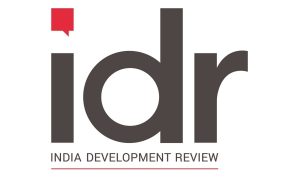A Prayer for Universal Wellbeing | Suparna Diwakar & Gerald WirthA Prayer for Universal Wellbeing | Suparna Diwakar & Gerald Wirth
Failure Files x The Wellbeing ProjectFailure Files x The Wellbeing Project

Failure is a part of life, especially for those working on complex issues for social change. Yet, very few people talk about failure, the deep impact it has on individuals as well as those around them, and the life lessons that come from failing.
To break this silence, The Wellbeing Project is partnering with India Development Review (IDR).
The partnership with IDR will bring forth stories at the intersection of failure and well-being through IDR’s Failure Files, a multimedia initiative that seeks to normalise conversations around failure in the pursuit of social change.
We invite you to tune into the Failure Files podcast, to hear the inspiring stories of people who have failed forward. Listen to social entrepreneurs, a Dalit rights activist, and an Olympic gold medallist tell us about their failures, how it impacted both individual and collective well-being, and what the road to recovery and resilience looks like.
EPISODE 1
Having a dream is not enough | Vishal Talreja, Suchetha Bhat
In Part I of this conversation with IDR, Dream a Dream’s co-founder Vishal Talreja and CEO Suchetha Bhat share the story of the organisation’s implosion, Vishal’s burnout, and how owning up to failure was the first step in figuring out the way to build back up.
EPISODE 2
The road to recovery | Suchetha Bhat, Vishal Talreja
In Part II of this conversation, Dream a Dream CEO Suchetha Bhat and co-founder Vishal Talreja talk about what it took to rebuild an organisation in crisis, and how that led to discovering a new kind of leadership—one that the world needs more of.
EPISODE 3
Preparing for a marathon, not a sprint | Thenmozhi Soundararajan
What does self-care mean for those who are fighting systems of oppression and discrimination that are set up against them? On this episode, Thenmozhi Soundararajan, founder and executive director of Equality Labs, a Dalit civil rights organisation, talks about how systems of oppression affect well-being, what healing looks like for individuals and communities, and why failure is an opportunity to build power.
ABOUT INDIA DEVELOPMENT REVIEW ABOUT INDIA DEVELOPMENT REVIEW

India Development Review (IDR) is Asia’s largest online media platform covering social change. IDR publishes cutting-edge ideas, lessons and insights, written by and for the people working on some of India’s toughest problems.
FOLLOW IDR ON SOCIAL MEDIA :
Nikhil Chopra’s participation in the Summit involves a residency period and a 2-day long performance, during which the artist will engage in both everyday actions, and the creation of a monumental drawing and atmospheric mise en scene.
Location: Aldama Fabre
OPEN TO THE PUBLIC
Date: June 2 – 3
Time: 10am – 10am CET. 24 hour performance
On the second day, the performance will incorporate Bilbao’s citizens and Summit attendees around a celebration of community and art. The paintings, drawings and other objects created along these actions are a residual component of the performance. Bending gender, shape and identity, India’s best known performance artist uses personal history to question nationhood and existentialism.
Born in Kolkata and based in Goa, Nikhil Chopra’s art focuses on performance. The body becomes a tool and canvas for art. He is best known for durational performances in which he takes on the persona of different characters, inspired by personal familial history and national, regional and colonial histories.
Nikhil Chopra has performed and exhibited his art before a global audience since the mid 2000s. His art has featured in gallery and institutional shows, art fairs, and other major art events worldwide. In the live performance “Lands, Waters, and Skies” (2019), the artist worked in the galleries of The Metropolitan Museum of Art for nine consecutive days, adopting various personae and critically engaging with the museum’s collection and its organizational principles.
ESPAÑOL
La participación de Nikhil Chopra en la Cumbre implica un periodo de residencia y una actuación de dos días de duración, durante la cual el artista realizará tanto acciones cotidianas como la creación de un dibujo monumental y una puesta en escena atmosférica.
En el segundo día, la presentación incorporará a los ciudadanos de Bilbao y a los asistentes a la Cumbre en torno a una celebración de la comunidad y el arte.Las pinturas, dibujos y otros objetos creados a lo largo de estas acciones son un componente residual de la actuación. Doblando el género, la forma y la identidad, el artista de performance más conocido de la India utiliza la historia personal para cuestionar la nación y el existencialismo.
Nacido en Calcuta y establecido en Goa, el arte de Nikhil Chopra se centra en la representación. El cuerpo se convierte en una herramienta y un lienzo para el arte. Es conocido por sus actuaciones de larga duración en las que adopta la personalidad de distintos personajes, inspirados en su historia familiar y en la nacional, regional y colonial.
Nikhil Chopra ha actuado y expuesto su arte ante un público mundial desde mediados de la década de 2000. Su arte ha aparecido en galerías y exposiciones institucionales, ferias de arte y otros importantes eventos artísticos en todo el mundo. En la obra en vivo “Lands, Waters, and Skies” (2019), el artista trabajó en las galerías del Museo Metropolitano de Arte durante nueve días consecutivos, adoptando varios personajes y comprometiéndose críticamente con la colección del museo y sus principios organizativos.
“TO REALIZE IT’S OK NOT TO CONTINUE AND TO TAKE SOME TIME AND BREATHE BEFORE CARRYING ON.” “TO REALIZE IT’S OK NOT TO CONTINUE AND TO TAKE SOME TIME AND BREATHE BEFORE CARRYING ON.”
“I DON’T THINK THAT THERE IS ONE PERFECT TIME FOR SOMEBODY TO UNDERGO A PROCESS OF WELLBEING.” “I DON’T THINK THAT THERE IS ONE PERFECT TIME FOR SOMEBODY TO UNDERGO A PROCESS OF WELLBEING.”
By Kabir Vajpeyi and Jacquelyn Salvador
There are moments in life when we become acutely, almost obsessively focused on what we’re doing. This focus can be useful for making progress in specific areas, but it can also cause us to forget about the context and other areas that are just as important. This is the issue Kabir Vajpeyi ran into when he became enveloped by his work with learning and child development. He’d been neglecting the human element — both within himself and for others. Slowly but surely, the pressure that he put on himself began to make it difficult to relate to people, and left him feeling rushed and worn down.
“If someone said they weren’t feeling well, my thought wasn’t how to take care of them,” Kabir explains, “it was ‘who’s going to finish this job.’”
His self-imposed drive to work and make progress also prevented him from spending time and connecting with his family. He worked late, and he noticed his personality taking a turn for the worse as the demand increased and took a toll on his energy and emotions. It was Kabir’s wife who finally expressed her mounting concerns for his wellbeing, which led to Kabir’s participation in The Wellbeing Project. Within the program’s community of support and wellness-centered retreats for entrepreneurs and changemakers, Kabir came face-to-face with the importance of taking care of his own wellbeing. He realized that it was critical in order to make a greater impact through his work.
“I was spending something so precious and tender, rather ruthlessly – life.
To me, the well-being journey has been literally a poignant, beautiful pause. A pause to stay still, sit down, look inside, feel, become aware and nourish my inner-being. And moving on with heightened self-awareness, repose and quietude, profoundly more sensitivity and responsiveness in life.
It made me focus on myself, without any guilt. I understood that working on self is not being self-centric. In fact, it is the most unique and beautiful gift to oneself and everyone around.
Earlier my work was my only identity. Now, this is no longer true. Now, at first, I am human being – a son, a brother, a classmate, a husband, a father…a friend.
Earlier my relationship with everyone was largely functional or work-centric. I would find myself helpless and even hopeless on matters related to relationship. With uncompromising support of some of the most outstanding resource persons at the Well-being project, I was able to work on almost all my significant relationships – with my own self, my attitudes, with my immediate and larger family, my friends, my neighbours, my colleagues at work, my work.
Later, on my own, I worked with my clients and everyone whom I meet every day. I discovered the value of being humane, kind and compassionate with everyone. I now practice it. It has made a huge difference in the quality of my relationships with everyone. This is now positively impacting not just me, but with almost everyone whom I am engaging at personal, social or professional level.
I discovered that I cannot change the world at all. Unless I change, nothing will change around me. I must be able to take responsibility and not blame others. To begin with, the one thing I can immediately change is, how I respond to what is going on around me. Matters may not have changed much in substance around me, but now, rather than reacting, I am able to sensitively contemplate and respond to it. I have become better at it. This has reduced my stress and anxiety substantially and I am able to respond to most difficult situations rather calmly – with greater sensitivity and patience.
I took upon a meditation practice and this has qualitatively changed the way now I feel and think. This has fundamentally changed my state from being anxious and stressed to being aware and peaceful. It has also changed how I engage with different people; how I work – how I am able to find solutions, contemplate and deliver them to the society and the government.
I realized that well-being is not just for me. It is everyone, everywhere in the nature. I cannot keep it to myself. If I am able to experience and live it, so could everyone around me too. I am striving for this at my own level.
I know that it’s a journey worth continuing…”
In looking back, one of the most interesting revelations Kabir had from The Wellbeing Project was that the greatest work and progress was made not by focusing on the work itself, but by shifting toward a focus on the participant’s deeper needs and elements. In fact, even though he and the other participants were all deeply involved in and committed to their work, they rarely ever talked about work during their participation in The Wellbeing Project. That’s what created such a nurturing atmosphere for change and growth. The ability to slow down and really focus on the human element created a powerful foundational shift within Kabir. He’s now seen firsthand the importance of inner wellbeing, which enables us to do our greatest good. That element has created positive effects in his personal emotions, his relationships, his work interactions and his overall work.
Kabir is now a strong advocate of taking action to set the process of wellbeing into motion, whenever and wherever we notice that need. “You don’t need to first burn out and then get into [wellbeing],” Kabir offers as encouragement, “whenever you realize its significance, that’s when to start realizing who you are, what is inside you, what you can offer.”












































